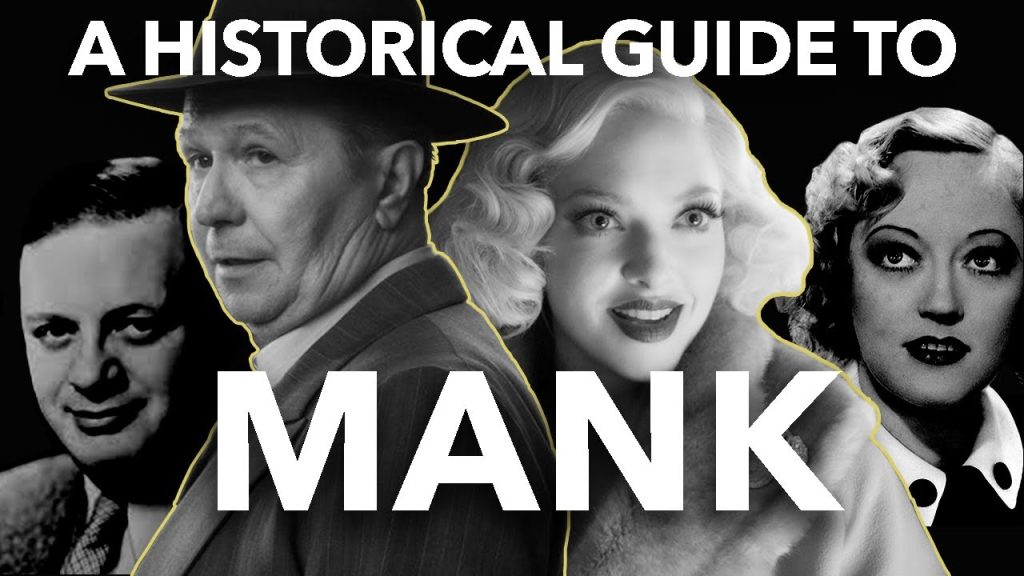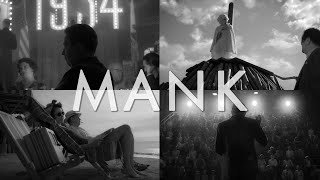Language: English
Genre: Historical Drama / Biographical / Political Satire
Director: David Fincher
Writer: Jack Fincher (his late father)
Starring: Gary Oldman, Amanda Seyfried, Charles Dance, Arliss Howard, Lily Collins
Setting: 1930s–40s Hollywood

1. What is Mank really about?
On the surface, Mank is a biographical drama about Herman J. Mankiewicz, the screenwriter behind Citizen Kane—often hailed as the greatest film of all time. But beneath its Hollywood biopic shell, Mank is a film about:
- The loneliness of genius
- The moral compromise of artists in a system driven by power
- The corrosive link between politics, propaganda, and cinema
- And the final, bitter truth that some voices write history, while others merely live in its shadows
This is not a love letter to old Hollywood. It is a requiem.
2. Structure: A Script Inside a Script
The film unfolds in a non-linear, screenplay-like format, mirroring the structure of Citizen Kane. Flashbacks interweave with present-day scenes as Mank, recovering from a car accident in a desert retreat, attempts to write the screenplay for Kane.
- Present Timeline (1940): Mank is isolated, injured, dictated to by Rita (his secretary), and fighting alcoholism. He is under pressure to deliver the Kane script to Orson Welles.
- Past Timeline (1930s): We see how Mank navigated the golden age of MGM studios, befriended powerful figures like William Randolph Hearst and Marion Davies, and gradually burned bridges.
This fractured structure reflects Mank’s mind—erratic, brilliant, damaged, and full of ghosts.
3. Herman J. Mankiewicz – The Tragic Maverick
Mank, played with exhausted brilliance by Gary Oldman, is a contradiction:
- A jester in the court of kings
- A cynic who still believes in ideals
- A man who wants credit, but not servitude
He’s whip-smart, sardonic, and constantly drunk. But his self-destruction isn’t just alcoholism—it’s moral despair. He knows that the powerful puppeteer Hollywood. He’s seen truth become fiction. And he himself has helped it happen.
Writing Citizen Kane becomes his act of rebellion—not just against Hearst, but against the very system that fed him.
“You cannot capture a man’s life in two hours. All you can hope is to leave the impression of one.”
Mank wants to leave that impression—but not of Kane, of himself.
4. Marion Davies – Misunderstood Muse
Amanda Seyfried’s portrayal of Marion Davies is a surprise jewel. Davies, in real life, was long maligned as the “bimbo” caricature from Citizen Kane—but Mank rewrites that narrative.
Here, she is:
- Witty, clever, and far more self-aware than people assume
- A victim of public misperception
- Trapped between her love for Hearst and her private discomfort with his power
Her relationship with Mank is platonic, respectful, and deeply layered. They connect not as lovers, but as two people who see each other clearly amid a world of illusions.
Marion is the film’s moral compass—human, warm, real.
5. William Randolph Hearst – Power Cloaked in Charm
Charles Dance plays Hearst not as a villain, but as an emperor in denial—gracious on the outside, ruthless beneath. He is Hollywood’s godfather: feeding artists, flattering them, then using them as tools.
To Mank, Hearst is both father figure and object of contempt.
To Marion, he’s both protector and prison.
To the world, he’s untouchable—until Citizen Kane threatens his myth.
“You may not write about me, but I will not be erased by you.”
That’s the chilling war at the heart of Mank—a battle over who controls the narrative.
6. Hollywood as Empire
This is not the romanticized Tinseltown. It’s a machine, run by moguls, fueled by money, and manipulative in its storytelling.
- Studio heads decide elections through fake newsreels
- Writers become servants for propaganda
- Stars are reshaped to fit studio lies
The film dives into the 1934 California gubernatorial race, where the studios backed Republican candidate Frank Merriam against socialist Upton Sinclair. MGM actually produced fake newsreels to turn voters. Mank witnesses this betrayal of truth—and feels complicit.
His conscience wakes too late, but Citizen Kane becomes his way to name names, call out the corruption, and punch upward.
7. Style: An Homage and a Critique
David Fincher (and writer Jack Fincher) make the bold choice to shoot the film like a 1940s movie:
- It’s in black and white
- The sound is mono, with a grainy, tin-can texture
- Scene transitions mimic vintage editing
- Cues like “EXT. MGM STUDIOS – DAY” appear as on-screen script notations
- Cigarette burns flash as if you’re watching an old reel
This stylistic choice immerses you in the era but also traps you in its illusions. The glamour feels beautiful, but suffocating. The nostalgia is hollow, deliberate.
Mank himself becomes a ghost within a system that’s still very much alive.
8. Emotional Undercurrents
Beneath the clever dialogue and political commentary lies a film about loneliness, regret, and the hunger for meaning:
- Mank is surrounded by people but emotionally exiled.
- He mocks Hollywood’s power but longs to be remembered by it.
- He loves his wife, “Poor Sara,” but buries her under layers of self-pity and booze.
- He knows he’s talented—but he wonders if he’s just been a clever court jester all along.
When he fights for screen credit on Citizen Kane, it’s not ego. It’s his soul clawing back relevance.
9. The Real Villain: Complicity
Everyone in Mank is compromised:
- Studio heads sell lies as entertainment
- Politicians ride cinema as a propaganda tool
- Writers like Mank watch silently, making jokes instead of standing up
The film doesn’t let anyone off the hook. Least of all its hero.
“You can’t capture a man’s life in two hours,” Mank says.
But what if the real story isn’t about the man who built the empire—but the man who wrote about him too late?
10. Final Message
Mank is not just about who wrote Citizen Kane. It’s about who gets to shape reality—and the price paid for telling the truth too late.
It’s about:
- The ghosts of talent wasted
- The poison of systemic corruption
- The dissonance between cleverness and courage
- The tragedy of being smart enough to see the rot but too broken to stop it
Conclusion
Mank is a deeply intelligent, emotionally tragic, and politically searing film. It wears the clothes of an old Hollywood biopic, but beneath its elegance lies a funeral for artistic integrity.
It doesn’t romanticize the past—it exhumes it. And in doing so, it asks us:
“Whose story are you watching?”
“Whose truth got left on the cutting room floor?”

